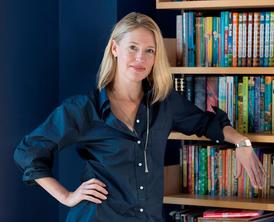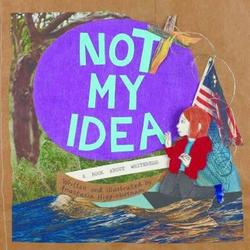
|
|
| photo: Alexa Hoyer | |
Jennifer Baumgardner is a feminist writer, activist, filmmaker and the publisher of Dottir Press, founded in 2018. Dottir will publish books by Michelle Tea, Brontez Purnell, Mike Perry and Rachel DeWoskin, among others. The press's debut title, released in September, is Not My Idea: A Book About Whiteness by Anastasia Higginbotham.
On your nightstand now:
Elif Batuman's The Idiot; a mini-stack of old New Yorkers; A Gentleman in Moscow by Amor Towles; and Severance by Ling Ma.
Favorite book when you were a child:
As a child in Fargo, I was often bored and had grand imaginary dreams for myself. I fantasized about having magical abilities, so I loved No Flying in the House by Betty Brock. The first book I remember closing and feeling sort of sad and lonely that I wouldn't be spending time in that character's world anymore was Addie Pray by Joe David Brown, which was the source material for the movie Paper Moon. Addie was a tomboyish 10-year-old (or thereabouts) whose mom dies, so she has to travel around with her biological father who is a petty criminal and doesn't want to be a parent. Addie ends up being great at the grift and becomes indispensable to him.
Your top five authors:
This list is a bit arbitrary but I'll go with David Sedaris, Nora Ephron, Michelle Tea, Miranda July and Audre Lorde.
Book you've faked reading:
I'm scared to admit this, but The Second Sex.
 Book you're an evangelist for:
Book you're an evangelist for:
West of Eden by Jean Stein, it's really odd, dark and gripping nonfiction dealing with old Hollywood material you might encounter on the podcast You Must Remember This, but from an insider's perspective. And The Perfect Nanny, the recently translated French novel by Leila Slimani, which I thought was a perfectly rendered depiction of the purchased care relationship.
Book you've bought for the cover:
I don't really buy books for their covers, though I do fondle books in stores for their covers. The best cover I've seen recently is Ling Ma's Severance. It looks like a generic pink file with a label-maker label. It's very creepy and striking. Severance is also a great, multivalenced title.
Book you hid from your parents:
I remember my mother balking when I tried to read dirty books by Harold Robbins, but I honestly can't remember a thing about what was in them. When I read Forever (Judy Blume) in around fifth grade, my parents made me discuss any "questions" I had. I asked what does it mean when Michael says, "I'm coming, I'm coming"--so they sort of regretted even engaging with me about it.
Book that changed your life:
Anyone who has experience with any part of adoption should read The Girls Who Went Away by Ann Fessler, which tells the story of women who were forced to surrender their babies pre-Roe v. Wade. I've given it to many people and used to teach it in my nonfiction writing seminar at the New School. It's profoundly illuminating--and humbling. I've written a lot about abortion as a journalist, and it wasn't until this book that I realized how narrow my understanding of reproductive experiences (and freedom) was.
Favorite line from a book:
The line that is popping into my head is: "Nothing seemed as alcoholic as quitting drinking. That was one thing that alcoholics did for sure." --Michelle Tea, Black Wave
Five books you'll never part with:
My first edition of Memoirs of an Ex-Prom Queen (Alix Kates Shulman); my childhood copies of Deenie, Then Again, Maybe I Won't and Are You There God, It's Me, Margaret (Judy Blume); and my 1984 edition of Our Bodies, Ourselves. It's really chunky and filled with line drawings of vacuum-suction abortion and the like.
Book you most want to read again for the first time:
I had a really emotional experience with The Corrections (Jonathan Franzen) the first time I read it. I felt very "seen" by this family epic that takes place between Thanksgiving and Christmas--in the mother's pronunciation of mature as "ma-toor," in Denise's cost-benefit analysis of her female vs. male lovers, in the five-person Midwestern family, etc. I sobbed when I closed the book. I've been afraid to read it again because I cherish the way I felt reading it back in 2001.
Are print books bound for extinction?
No, they are an ancient technology that has yet to be improved upon, in design or impact.

